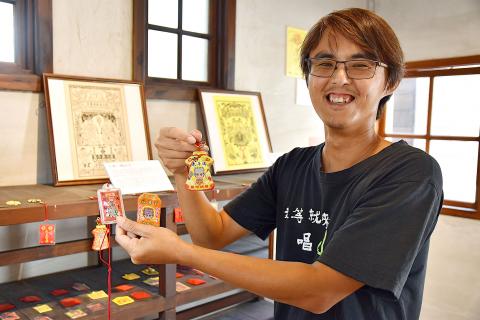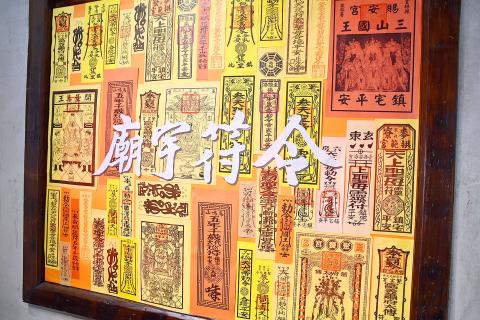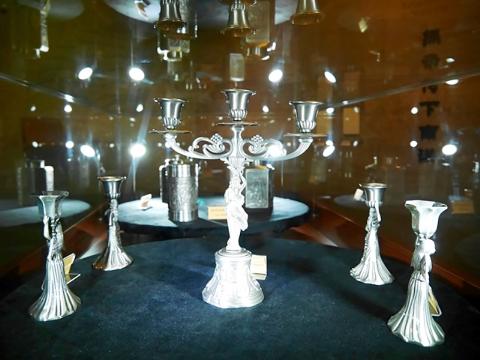The Taiwan Hakka Museum in Miaoli County’s Tongluo Township (銅鑼) is hosting an exhibition centered around Malaysian tin.
The year-long display, which opened on Sunday, is hosted by the Hakka Affairs Council to highlight how Hakka migrants were involved in mining in Malaysia.
The museum collaborated on the exhibition with Universiti Tunku Abdul Rahman in Malaysia and National Kaohsiung Normal University’s Center for Southeast Asian Studies, Taiwan Hakka Cultural Development Center director Ho Chin-liang (何金樑) said.

Photo: Huang Shu-li, Taipei Times
The exhibition focuses on the development of Malaysia’s tin industry, and how it led to Hakka migrants moving to Malaysia in the late 18th century, he said.
Hakka from Huizhou and Jiayingzhou, China, migrated to the Nanyang (南洋) region specifically because of its burgeoning tin trade and mining sector, the museum said.
Nanyang is the Chinese term for Southeast Asia and India.

Photo: Huang Shu-li, Taipei Times
Some of the Hakka who mined for tin became rich and played a dominant role in the development of cities on the Malaysian peninsula, the museum said.
The Hakka in the region formed ethnicity-based self-help groups to assist each other, a departure from the agricultural or deity-based organizations that Taiwanese Hakka have adopted.
The exhibition includes products from the Kinta Tin Mining Museum in Malaysia, as well as artifacts, documents and pictures from Hakka organizations in the area, the museum said, adding that it is to run through Sept. 14 next year.

Photo courtesy of Taiwan Hakka Cultural Development Center
In Yunlin County, an exhibition of Taoist talismans and pouches from different temples across Taiwan opens tomorrow and is to run through Oct. 21 at the Yunlin Memory Cool shop in Huwei Township (虎尾).
Curator Lee Han-peng (李漢鵬) on Wednesday said that he was always interested in the talismans and pouches handed out by temples, so he started collecting them.
For example, large talismans, or shenma (神媽), are not meant to be carried around, Lee said, adding that large talismans are, “in essence, a splinter of a deity,” handed out by temple staff so that followers can worship at home, he said.
They are meant for devout believers who cannot afford to keep a physical representation of a deity in their homes, he said, adding that usually temple staff will carve the prime deity that the temple worships onto wood, using it to make rubbings on yellow or red paper.
As wood can be damaged, every temple has variations of the same talisman, with some no longer in circulation or very rare.
However, talismans for safety are meant to be carried around, Lee said, adding that they are sometimes burned, so that their ash can be kept in a pouch, which is easier to carry.
Temples have kept up with the times, so talismans are sometimes made from plastic or are made to look cute, Lee added.
It is the first exhibition of talismans in the county, Yunlin Memory Cool shop owner Tseng Pei-ting (曾沛庭) said.
Visitors are welcome to bring their own safety talismans or pouches to share, Tseng said.

Taipei has once again made it to the top 100 in Oxford Economics’ Global Cities Index 2025 report, moving up five places from last year to 60. The annual index, which was published last month, evaluated 1,000 of the most populated metropolises based on five indices — economics, human capital, quality of life, environment and governance. New York maintained its top spot this year, placing first in the economics index thanks to the strength of its vibrant financial industry and economic stability. Taipei ranked 263rd in economics, 44th in human capital, 15th in quality of life, 284th for environment and 75th in governance,

The Sports Administration yesterday demanded an apology from the national table tennis association for barring 17-year-old Yeh Yi-tian (葉伊恬) from competing in the upcoming World Table Tennis (WTT) United States Smash tournament in Las Vegas this July. The sports agency said in a statement that the Chinese Taipei Table Tennis Association (CTTTA) must explain to the public why it withdrew Yeh from the WTT tournament in Las Vegas. The sports agency said it contacted the association to express its disapproval of the decision-making process after receiving a complaint from Yeh’s coach, Chuang

Control Yuan Secretary-General Lee Chun-yi (李俊俋) tendered his resignation last night, admitting that he had misused a government vehicle, as reported by media. His resignation was immediately accepted by the Control Yuan. In a statement explaining why he had resigned, Lee apologized for using a Control Yuan vehicle to transport his dog to a pet grooming salon on May 20. The issue first came to light late last month, when TVBS News reported that Lee had instructed his driver to take the dog to the salon. The news channel broadcast photos that it said were taken by an unnamed whistle-blower, which purportedly showed the

A former officer in China’s People’s Liberation Army (PLA) who witnessed the aftermath of the 1989 Tiananmen Square massacre has warned that Taiwan could face a similar fate if China attempts to unify the country by force. Li Xiaoming (李曉明), who was deployed to Beijing as a junior officer during the crackdown, said Taiwanese people should study the massacre carefully, because it offers a glimpse of what Beijing is willing to do to suppress dissent. “What happened in Tiananmen Square could happen in Taiwan too,” Li told CNA in a May 22 interview, ahead of the massacre’s 36th anniversary. “If Taiwanese students or